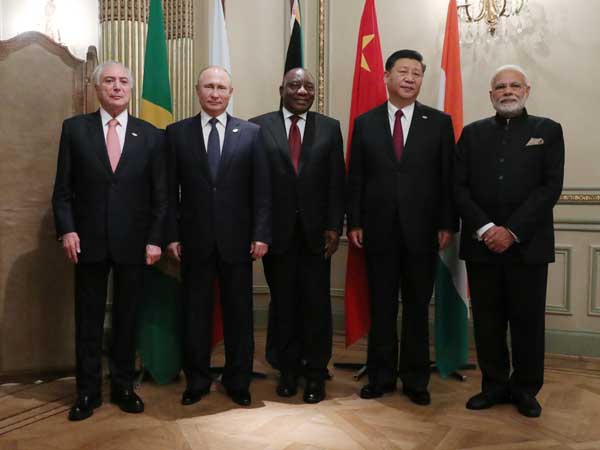
The past year has seen an improvement in ties with two countries of major interest to India; namely China and Russia. Bilateral summits between India and China, and India and Russia helped clear the air between them and set ties on an even keel.
After a period of muscular diplomacy and increasing acrimony, both India and China have settled down to a more prudent and tactful engagement after prime minister Narendra Modi’s meeting with Chinese president Xi Jinping at Wuhan. New Delhi has also avoided displaying any edginess over China’s growing influence in the South Asian region. The most recent high-level contact between Beijing and New Delhi was the high level meeting on Cultural and People to People contact between external affairs minister Sushma Swaraj and the visiting Chinese foreign minister Wang Yi. The focus of the meeting was on cultural contact, people-to-people interaction and tourism.
Modi’s informal meeting with Russian President Vladimir Putin in May reiterated the special strategic partnership and the importance of the defence cooperation with Russia. India concluded the contract to buy the Russian S-400 missile system despite the threat of sanctions under the American law, CAATSA, (Countering America’s Adversaries through Sanctions). The American pressure of sanctions against Russia and Iran was disregarded to go ahead with the missile deal and the collaboration with Iran on the Chabahar port and access to Afghanistan and Central Asia.
The promise of better ties with the US under US president Donald Trump, especially as Trump railed against Pakistan’s for its support to terrorism, have been belied as Trump focused on China and Russia. However, defence ties became closer with the signing of the Communications Security Memorandum of Agreement (COMCASA) that creates communications compatibility which would allow India access to America’s secure communications systems. India and the US also held the first ministerial Two-plus-Two meeting of their foreign and defence ministers meeting together.
Trump’s sudden decision to withdraw troops from Afghanistan after his controversial plan to withdraw from Syria led to the departure of his defence secretary James Mattis, has serious implications for New Delhi. India has invested a great deal in development projects in Afghanistan. The departure of a major part of the US contingent will effectively bring an end to any possibility of a military solution and would change the security dynamics in the war torn country.
Trump has taken a political decision that will appeal to the American public. The Taliban have been gaining ground; the surge of American troops under Trump has not improved the security situation and Washington is looking at a political solution to help withdraw from Afghanistan. Washington has renewed its efforts to engage the Taliban with a recent meeting of US Special Representative Zalmay Khalilzad with Taliban representatives in Abu Dhabi. Khalilzad has also indicated that Pakistan had helped persuade the Taliban for the Abu Dhabi meeting. Pakistan is no longer anathema for Trump; despite all his criticism of Pakistan, Trump wrote to Imran Khan seeking Pakistan’s help for the peace talks with the Taliban.
The new government in Islamabad led by prime minister Imran Khan made overtures to New Delhi, with his promise to take two steps forward to one step forward by India. But the Modi government has not responded, even rejecting a suggestion that the two Foreign Ministers have a meeting in New York during the UN General Assembly session. With the clear backing of the Pakistan army chief, Pakistan has offered the most significant confidence building measure in recent times in the offer to open a corridor to the Gurdwara Darbar Sahib Kartarpur, four kms from the Indian border.
Relations with two neighbours, Nepal and Maldives, which were in the doldrums, have seen a revival during 2018. The Left Front government in Nepal has responded to Indian attempts to stabilize the bilateral relations even as Kathmandu has worked to deepen cooperation with China. Elections in Maldives brought a new government under President Ibrahim Mohamed Solih, who reiterated his ‘India First’ policy during a recent state visit to India. Both Nepal and Maldives are part of China’s Belt and Road Initiative (BRI), where large Chinese assisted infrastructure projects are underway. The Rohingya issue affected India’s ties with both, Bangladesh and Myanmar but New Delhi has offered substantial assistance to both countries to address the problems of the Rohingya refugees.
All regional powers including China and Iran favour talks with the Taliban. Russia launched its own Afghanistan initiative with peace talks in Moscow that included a Taliban delegation. Moscow persuaded New Delhi to change its stance on the Taliban to send a representative to the talks in Moscow. The new year will bring several new challenges for India; and topmost among them will be the impact of the unsettled situation in Afghanistan as the US troops withdraw.





